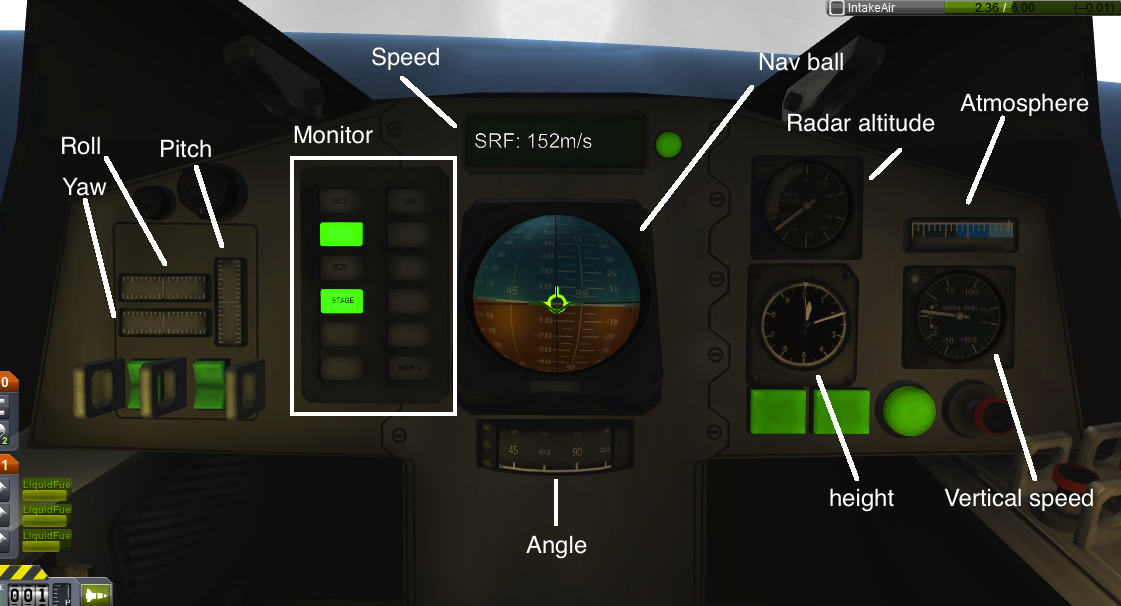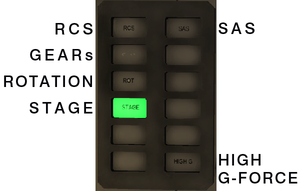Difference between revisions of "Intra-Vehicular Activity"
(! various stuff, * correct usage of "altitude" (above sea level) and "altimeter" (above ground), * "vehicle"/"vessel" to "craft", - interaction, got disabled in 0.20, - stub) |
m (*style of images; !altimeter is the device to measure the altitude and has nothing to do if AGL/A(M)SL;) |
||
| Line 1: | Line 1: | ||
During an '''Intra-Vehicular Activity''' (abbr. '''IVA''') the player takes control of a [[Kerbal]] within a craft's [[Command Pod|command module]]. The controls are the same as in third-person view. One can enter/leave IVA by either selecting "IVA" when mousing over a crew member, or pressing C to toggle. | During an '''Intra-Vehicular Activity''' (abbr. '''IVA''') the player takes control of a [[Kerbal]] within a craft's [[Command Pod|command module]]. The controls are the same as in third-person view. One can enter/leave IVA by either selecting "IVA" when mousing over a crew member, or pressing C to toggle. | ||
| − | The primary advantage of IVA is the radar altimeter within certain command modules. Rather than altitude above sea level, it shows the craft's | + | The primary advantage of IVA is the radar altimeter within certain command modules. Rather than altitude above sea level, it shows the craft's altitude above ground level (abbr. AGL), taking mountains and valleys into account. This information can be especially helpful during landings on uneven terrain. |
However, even though Intra-Vehicular Activity is implemented, the player can only look around and read the instruments, but cannot interact with the interior or move a Kerbal. This has been planned to be improved in a future version. | However, even though Intra-Vehicular Activity is implemented, the player can only look around and read the instruments, but cannot interact with the interior or move a Kerbal. This has been planned to be improved in a future version. | ||
== Cockpit == | == Cockpit == | ||
| − | When going into the IVA mode, most of the HUD will disappear and the control panel inside the cockpit will be visible instead. Most of the instruments on this new control panel are easy to understand. | + | When going into the IVA mode, most of the HUD will disappear and the control panel inside the cockpit will be visible instead. Most of the instruments on this new control panel are easy to understand. While the instruments are having the same appearance in all available IVAs, the layout differs. |
| − | [[File:IVA.png| | + | [[File:IVA.png|100%|center|frame|View from inside the [[Mk1 Cockpit]]]] |
| − | |||
| − | |||
=== Roll, Pitch and Yaw === | === Roll, Pitch and Yaw === | ||
| Line 16: | Line 14: | ||
=== Monitor === | === Monitor === | ||
| + | [[File:Monitor.png|thumb|Monitor with only staging enabled]] | ||
The monitor shows things that can be difficult or impossible to see from inside the vehicle, such as the state of [[SAS]] or [[RCS]], or the ability to separate a [[stage]]. They are indicated using green lights. | The monitor shows things that can be difficult or impossible to see from inside the vehicle, such as the state of [[SAS]] or [[RCS]], or the ability to separate a [[stage]]. They are indicated using green lights. | ||
| − | |||
| − | |||
=== Speed === | === Speed === | ||
| Line 27: | Line 24: | ||
=== Radar Altimeter === | === Radar Altimeter === | ||
| − | While normal altitude indicators display | + | While normal altitude indicators display altitude above (mean) sea level (abbr. ASL or AMSL), the radar altimeter displays the craft's height above the ground. This information is not displayed on the third person interface, which means that IVA landings have a unique advantage. The advantage is offset by the fact that the third person view can swivel freely, affording a more comprehensive view of the surface than the IVA perspective. |
=== Atmosphere === | === Atmosphere === | ||
| Line 33: | Line 30: | ||
=== Altitude === | === Altitude === | ||
| + | [[File:Height.png|thumb|The example above shows an altitude 2000 meters.]] | ||
The Altitude (or Height Monitor) shows the craft's current height above sea level. This information is displayed in analog form familiar to airplane pilots. However, unlike airplane altimeters which work on air pressure, this one works even the cold dark hard vacuum of space. How does it do this? The magic of electronics! | The Altitude (or Height Monitor) shows the craft's current height above sea level. This information is displayed in analog form familiar to airplane pilots. However, unlike airplane altimeters which work on air pressure, this one works even the cold dark hard vacuum of space. How does it do this? The magic of electronics! | ||
| − | |||
| − | |||
| − | |||
| − | |||
=== Vertical speed === | === Vertical speed === | ||
The vertical speed is shown in meters per second (m/s) on a gauge similar to the one on the HUD. | The vertical speed is shown in meters per second (m/s) on a gauge similar to the one on the HUD. | ||
Revision as of 14:25, 31 May 2013
During an Intra-Vehicular Activity (abbr. IVA) the player takes control of a Kerbal within a craft's command module. The controls are the same as in third-person view. One can enter/leave IVA by either selecting "IVA" when mousing over a crew member, or pressing C to toggle.
The primary advantage of IVA is the radar altimeter within certain command modules. Rather than altitude above sea level, it shows the craft's altitude above ground level (abbr. AGL), taking mountains and valleys into account. This information can be especially helpful during landings on uneven terrain.
However, even though Intra-Vehicular Activity is implemented, the player can only look around and read the instruments, but cannot interact with the interior or move a Kerbal. This has been planned to be improved in a future version.
Contents
Cockpit
When going into the IVA mode, most of the HUD will disappear and the control panel inside the cockpit will be visible instead. Most of the instruments on this new control panel are easy to understand. While the instruments are having the same appearance in all available IVAs, the layout differs.

Roll, Pitch and Yaw
The Roll, Pitch and Yaw indicators look similar to the ones in the normal game HUD.
Monitor
The monitor shows things that can be difficult or impossible to see from inside the vehicle, such as the state of SAS or RCS, or the ability to separate a stage. They are indicated using green lights.
Speed
The speed is shown in meters per second (m/s).
The navball looks and works exactly as the normal navball. However, in IVA mode you can zoom in on the navball, allowing precision alignment difficult to accomplish with the third person interface.
Radar Altimeter
While normal altitude indicators display altitude above (mean) sea level (abbr. ASL or AMSL), the radar altimeter displays the craft's height above the ground. This information is not displayed on the third person interface, which means that IVA landings have a unique advantage. The advantage is offset by the fact that the third person view can swivel freely, affording a more comprehensive view of the surface than the IVA perspective.
Atmosphere
This gauge displays the atmospheric density. It is identical to the corresponding display in the third person interface.
Altitude
The Altitude (or Height Monitor) shows the craft's current height above sea level. This information is displayed in analog form familiar to airplane pilots. However, unlike airplane altimeters which work on air pressure, this one works even the cold dark hard vacuum of space. How does it do this? The magic of electronics!
Vertical speed
The vertical speed is shown in meters per second (m/s) on a gauge similar to the one on the HUD.

